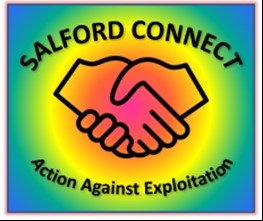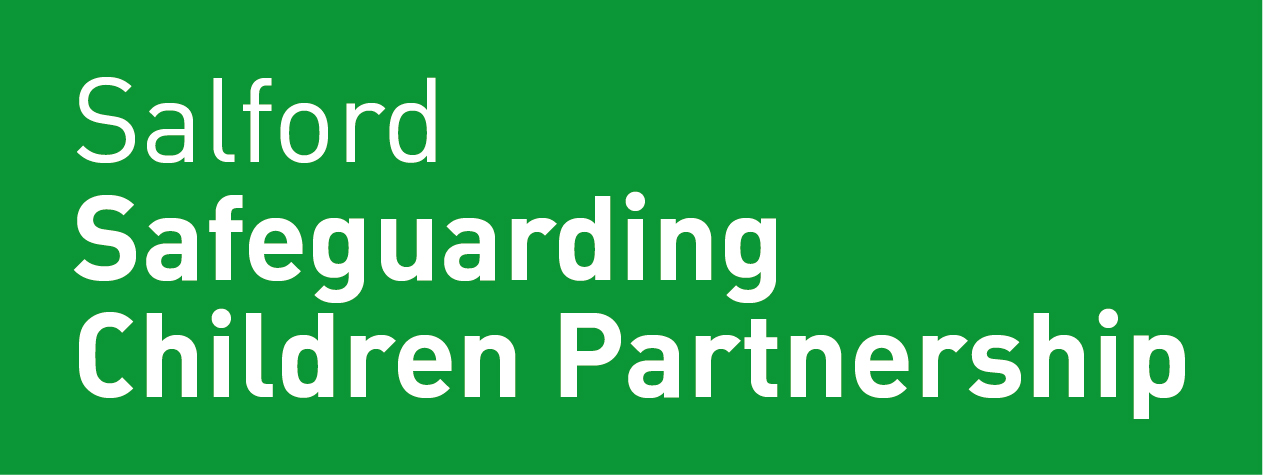Child Exploitation
The Greater Manchester Review of Children’s Services (December 2017) defined Complex Safeguarding as “Criminal activity (often organised), or harmful behaviour associated to criminality, involving children, young people and adults with multiple vulnerabilities where there is exploitation, a risk of exploitation and/or a clear or implied safeguarding concern.”
Salford has a multi-agency response to Complex Safeguarding, working in partnership with the Salford Safeguarding Children Partnership, Salford Safeguarding Adult Board and the Community Safety Partnership, ensuring children and vulnerable adults are protected and supported.
What is Salford Connect, Action Against Exploitation? (formerly known as Complex Safeguarding Hub)

Connect is Salford's response to the exploitation of children and adults. This includes Child Sexual Exploitation, Child Criminal Exploitation, Human Trafficking, Modern Slavery and Cuckooing. The multi-agency team was formed in January 2019 using existing Operation Pheonix workers. Since this time there has been a significant increase in workers. It is now resourced with police detectives, children’s social workers, a youth worker, a Barnardos worker, a parenting worker, a children’s psychotherapist and health practitioners. The team is co-located in Salford. There is a constant drive to further develop links with other partners in Salford to achieve our aims of improving outcomes for children, young people and adults and disrupt and prosecute perpetrators of exploitation.
Complex Safeguarding, Contextual Safeguarding and Transitional Safeguarding – what’s the difference?
What is Child Sexual Exploitation (CSE)?
Child Sexual Exploitation is a form of child sexual abuse. It occurs where an individual or group takes advantage of an imbalance of power to coerce, manipulate or deceive a child or young person under the age of 18 into sexual activity (a) in exchange for something the victim needs or wants, and/or (b) for the financial advantage or increased status of the perpetrator or facilitator. The victim may have been sexually exploited even if the sexual activity appears consensual. Child sexual exploitation does not always involve physical contact; it can also occur through the use of technology. (Child sexual exploitation CSE DfE, 2017)
'The sexual exploitation of children and young people under 18 involves exploitative situations, contexts and relationships where young people receive 'something' (eg food, accommodation, drugs, alcohol, cigarettes, affection, gifts, money) as a result of performing, and/or others performing on them, sexual activities.
Child sexual exploitation can occur through use of technology without the child's immediate recognition; for example the persuasion to post sexual images on the internet/mobile phones with no immediate payment or gain. In all cases those exploiting the child/young person have power over them by virtue of their age, gender, intellect, physical strength and/or economic or other resources'.
(The National Working Group for Sexually Exploited Children and Young People, 2008)
Salford's Joint Exploitation Strategy was published in April 20204 by the SSCP, the Salford Safeguarding Adults Board (SSAB), and the Salford Community Safety Partnership.
The SSCP has developed a CSE operational handbook (Adobe PDF format, 412kb) to support practitioners, individuals and the community in effectively tackling CSE within Salford when considering and exploring Child Sexual Exploitation concerns and referrals.
The website It's not okay aims to raise awareness of child sexual exploitation. The website gives information about CSE, advice and support, contact information for specialist teams in Greater Manchester, information about how to report CSE and a suite of posters and leaflets to support the campaign.
For more information and support on child sexual abuse visit the SSCP web page Child Sexual Abuse.
Child Sexual Exploitation Training & Resources
- Virtual College - Child Sexual Exploitation
- Virtual College ‘Keep Them Safe: Protecting Children from Child Sexual Exploitation’
- Virtual College - Child and Adult Sexual Exploitation
- 7 Minute Briefing – CSE
- 7 Minute Briefing – CSE Plain text
- NSPCC Child Sexual Exploitation Guidance
- Contextual Safeguarding Network resources
Sex Extortion
NSPCC Learning has published a Helplines insight briefing on young people’s experiences of online sexual extortion, or ‘sextortion’. Drawing from contacts to Childline and the NSPCC Helpline in 2023/24, the briefing explores:
- how sextortion occurs and how it can escalate
- the impact on young people’s wellbeing
- how to spot the signs
- how to talk to young people at risk.
It also offers guidance for reporting and disrupting incidents of sextortion, should a child’s image ever fall into the wrong hands. Read the report: Young people’s experiences of online sexual extortion or ‘sextortion’
What is Child Criminal Exploitation (CCE)?
Child Criminal Exploitation occurs where an individual or group takes advantage of an imbalance of power to coerce, control, manipulate or deceive a child or young person under the age of 18. The victim may have been criminally exploited even if the activity appears consensual. Child Criminal Exploitation does not always involve physical contact; it can also occur through the use of technology. Criminal exploitation of children includes for instance children forced to work on cannabis farms or to commit theft’. The Home Office definition of child criminal exploitation (CCE)
Child Criminal Exploitation Training & Resources
- Criminal Exploitation & Gangs
- Fearless is where you can report crime anonymously
- Grooming (NSPCC)
- Virtual College - Gang Related issues and County Lines E-Learning
- 7 Minute Briefing – Child Criminal Exploitation
- 7 Minute Briefing – Child Criminal Exploitation plain text
- 7 Minute Briefing – County Lines, Drugs & Gangs
- 7 Minute Briefing – County Lines, Drugs & Gangs plain text
What is Modern Slavery & Human Trafficking?
Modern Slavery is the term used within the UK and is defined within the Modern Slavery Act 2015. The Act categorises offences of Slavery, Servitude and Forced or Compulsory Labour and Human Trafficking. These crimes include holding a person in a position of slavery , servitude forced or compulsory labour, or facilitating their travel with the intention of exploiting them soon after. Although human trafficking often involves an international cross-border element, it is also possible to be a victim of modern slavery within your own country. It is possible to be a victim even if consent has been given to be moved. Children cannot give consent to being exploited therefore the element of coercion or deception does not need to be present to prove an offence.
If you are concerned about a child being trafficked who lives or has links to Wales, Hampshire and the Isle of Wight, Greater Manchester, West Midlands, East Midlands or Croydon, please also fill in the ICTG trafficking referral form on the GOV.uk page on child trafficking advocates. You can also contact our 24/7 support line on 0800 043 4303 to talk through the concerns you have before putting in a referral.
Modern Slavery & Human Trafficking Training & Resources
- Barnardo’s Independent Child Trafficking Advocacy Service
- Barnardo’s Child Trafficking 24/7 Referral Line: 0800 043 4303
- Child Trafficking Advocates (Gov.uk)
- Modern Slavery Helpline: 08000 121700
- Modern Slavery Helpline Online Reporting
- Virtual College - Modern Slavery and Trafficking E-Learning
- 7 Minute Briefing – Child Trafficking
- 7 Minute Briefing – Child Trafficking plain text
What is cuckooing?
‘Cuckooing‘ is when criminals target the home of vulnerable person, often so they can use the property for criminal purposes such as drug-dealing, hiding weapons and other criminal activities. The term comes from the behaviour of cuckoo birds who take over the nests of other birds. A criminal will often befriend a vulnerable person in order to exploit them and use their property. The person is usually intimidated and too scared to report it to anyone.
If you are concerned that someone may be a victim of cuckooing or if you’re concerned about a drug related crime where you live, call the police on 101 or call 999 in an emergency. If the adult you are concerned about has care and support needs you should also contact Salford Adult Social Care.
If you don’t want to speak to the police directly, you can call the anonymous Crimestoppers on 0800 555 111.
Crimestoppers is an independent charity that works with police forces throughout the UK that people can use to pass on information about a crime anonymously.
- call 0800 555 111 (24 hours a day and 7 days a week)
- anonymous online reporting form
- you don’t have to give them your name or any personal information; calls are not recorded and cannot be traced
Training & Resources
- Cuckooing – advice for all – Salford Safeguarding Adult Board
- 7 Minute Briefing – Cuckooing – Salford Safeguarding Adult Board
- 7 Minute Briefing – Cuckooing plain text – Salford Safeguarding Adult Board
- Greater Manchester Programme Challenger – Cuckooing
Latest news
Details of all the latest news from the Salford Safeguarding Children Partnership.

